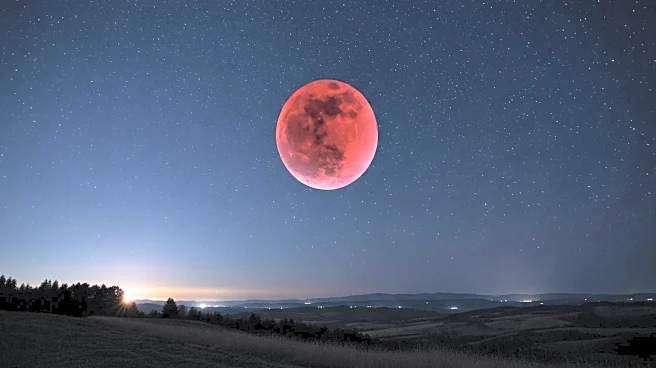What's Happening?
A total lunar eclipse, often referred to as a 'blood moon,' is scheduled to occur on September 7-8, 2025. This celestial event will be fully visible across many countries in Asia and Western Australia, with partial visibility in Europe, Africa, eastern Australia, and New Zealand. During a lunar eclipse, Earth positions itself directly between the Sun and the Moon, casting a shadow that causes the Moon to appear in a deep red or copper shade. This phenomenon occurs as sunlight passes through Earth's atmosphere, scattering shorter wavelengths and allowing longer wavelengths like red and orange to illuminate the Moon's surface. The upcoming eclipse marks the final lunar eclipse of 2025, following the first eclipse visible across the Americas in March.
Why It's Important?
Lunar eclipses, particularly total eclipses, are significant astronomical events that attract global attention due to their rarity and visual spectacle. The September blood moon offers a unique opportunity for millions of people across Asia and Australia to witness this natural phenomenon. Such events can inspire interest in astronomy and science, fostering educational opportunities and public engagement with celestial observations. Additionally, lunar eclipses have cultural and historical significance in various societies, often associated with myths and traditions. The visibility of this eclipse in diverse regions highlights the interconnectedness of global astronomical phenomena.
What's Next?
As the lunar eclipse approaches, astronomers and enthusiasts are likely to prepare for observation events and educational programs to maximize public engagement. Observatories and science centers may host viewing parties and workshops to educate the public about the science behind eclipses. In regions where the eclipse is visible, local communities might organize cultural events or gatherings to celebrate the occasion. The eclipse also provides an opportunity for scientific research, as astronomers can study the effects of Earth's atmosphere on the Moon's appearance during the eclipse.
Beyond the Headlines
Lunar eclipses can serve as a reminder of the intricate dynamics of celestial bodies and their impact on Earth. They offer a chance to reflect on the broader implications of space exploration and the importance of understanding our universe. The cultural significance of eclipses can also prompt discussions about the intersection of science and tradition, exploring how different societies interpret and celebrate these events.











